Well done professor!
Excellent Review of Quantitative Easing
[top]

And yet another central banker who doesn’t understand monetary operations…
Has to be a new low for the BOE.
Barker Says BOE Should Print Money as U.K. Recession Worsens
by Jennifer Ryan and Brian Swint
Mar 13 (Bloomberg) — Bank of England policy maker Kate Barker said the bank’s decision to buy assets with newly created money is necessary to prevent deflation as Britain’s recession shows signs of worsening.
Printing money “is the best course in order to achieve our objective of keeping inflation to target in the medium term.†“The downside risks to growth, and therefore to inflation, identified in the February inflation report were in danger of crystallizing,†she said. Barker said the impact of the reduction in the benchmark to lower levels had become “successively reduced†with each cut, and lower rates on their own would be insufficient to revive growth.
[top]
Copper fell with the Master’s inventory liquidation but then bottomed about the same time crude did. While gasoline demand started recovering from its modest declines back then it is doubtful if the same has happened with copper, as construction has continued to decline since then.
Market action feels like the producers got together and decided to cut back on supply.
Political leaders who understood markets would be looking into it.
Investors who recognize the economic value of oligopoly collusion might also look into it.
[top]
(email exchange)
Maybe they’re reading my blog???
>
> On Mar 13, 2009 at 7:06 am, John wrote:
>
> NOYER SAYS RISING DEFICITS MAY INCREASE SAVING BY EUROPEANS
>
> Story to follow.
>
[top]
(email exchange)
>
> On Thu, Mar 12, 2009 at 3:31 PM, Tom wrote:
>
> Christina Romer gave a speech on Monday at Brookings in which she
> strongly argued for dollar devaluation as a tool to create economic
> recovery.
>
Continues the beggar they neighbor policies that Paulson pushed.
>
> This is the sort of thing that provides political cover for Fed Chairman Ben
> Bernanke to pursue a more aggressive quantitative easing policy.
>
Yes, of course he doesn’t matter for anything of consequence, but that’s another story.
>
> Romer, who is chair of the Council of Economic Advisors, praised FDR’s
> 1933 decision to allow the gold price to float up from $20.63/oz. to
> $34.85/oz.
>
Yes, should have floated it entirely.
Back then, the gold standard constrained even the US Treasury from borrowing.
We don’t have that issue, so moving the USD down for that reason is moot.
>
> That decision offers a template for what the Fed could do today, she said
> (italics mine):
>
> This monetary expansion [in the wake of the 1933 devaluation] couldn’t
> lower nominal interest rates because they were already near zero. What it
> could do was break expectations of deflation.
>
That pesky, ridiculous, ‘inflation expectations theory’ again!
>
> Prices had fallen 25% between 1929 and 1933. People throughout the
> economy expected this deflation to continue. As a result, the real cost of
> borrowing and investing was exceedingly high.
>
Expectations had nothing to do with it. Lack of aggregate demand did. And the Treasury was revenue constrained due to the gold standard.
>
> Consumers and businesses wanted to sit on any cash they had because
> they expected its real purchasing power to increase as prices fell.
>
Not the reason. When on a gold standard, a rising value of gold is expressed by falling prices for everything else as gold is fixed.
Hence the revaluation upward of the price of gold which was a devaluation of the dollar. (Dollar buys less gold)
>
> Devaluation followed by rapid monetary expansion broke this deflationary
> spiral. Expectations of rapid deflation were replaced by expectations of
> price stability or even some inflation. This change in
> expectations brought real interest rates down dramatically.
>
No, deficit spending supported demand and broke the deflation.
>
> The change in the real cost of borrowing and investing appears to have had
> a beneficial impact on consumer and firm behavior. The first thing that
> turned around was interest-sensitive spending. For example, car sales
> surged in the summer of 1933. One sign that lower real interest rates were
> crucial is that real fixed investment and consumer spending on durables
> both rose dramatically between 1933 and 1934, while consumer spending
> on services barely budged.
>
Must have been something else going on.
>
> Romer’s analysis of the Roosevelt devaluation parallels Bernanke’s almost
> exactly.
>
Comforting!
>
> Bernanke also has written that loose monetary policy was the key to the
> economic recovery of 1933-34. Further on in her speech, Romer cautions
> against letting up on stimulative measures too quickly, lest the economy
> plunge back into recession, such as happened to the U.S. in 1937.
>
In 1937 there was a new whopping social security tax that was ‘off budget’ and sent the economy into a tailspin as it drained billions of financial assets from the private sector.
Doesn’t anyone in DC know how any of it works?????
[top]
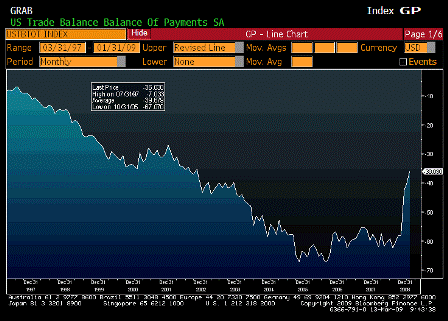
| Survey | -$38.0B |
| Actual | -$36.0B |
| Prior | -$39.9B |
| Revised | n/a |
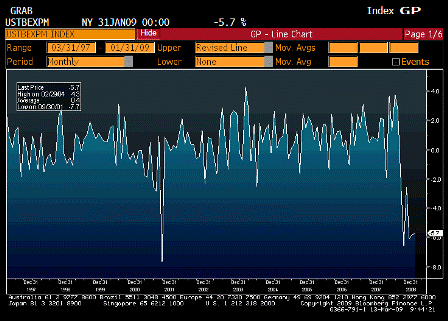
| Survey | n/a |
| Actual | -5.7% |
| Prior | -5.8% |
| Revised | n/a |
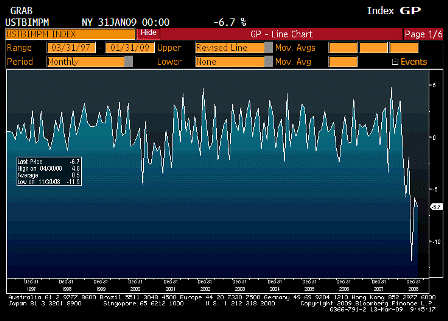
| Survey | n/a |
| Actual | -6.7% |
| Prior | -5.8% |
| Revised | n/a |
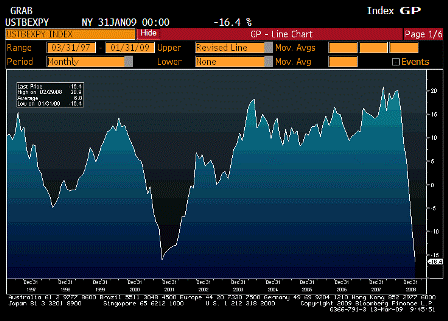
| Survey | n/a |
| Actual | -16.4% |
| Prior | -9.3% |
| Revised | n/a |
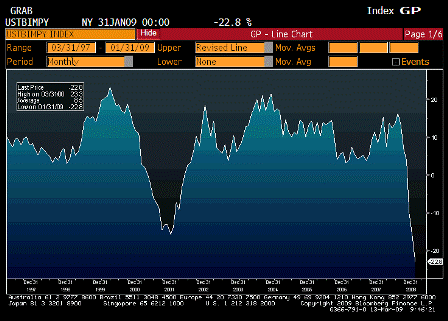
| Survey | n/a |
| Actual | -22.8% |
| Prior | -15.4% |
| Revised | n/a |
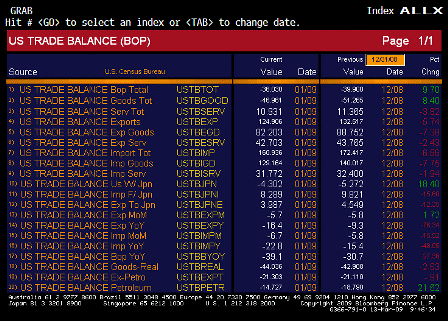
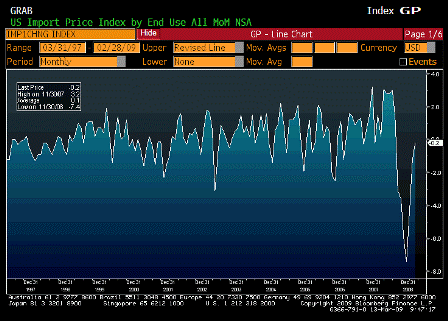
| Survey | -0.7% |
| Actual | -0.2% |
| Prior | -1.1% |
| Revised | -1.2% |
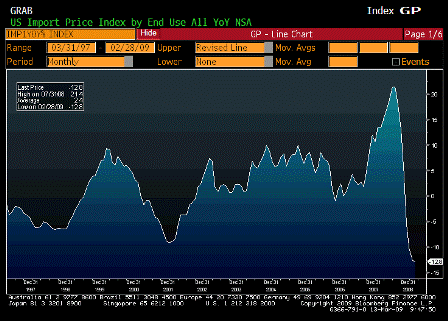
| Survey | -13.5% |
| Actual | -12.8% |
| Prior | -12.5% |
| Revised | -12.5% |
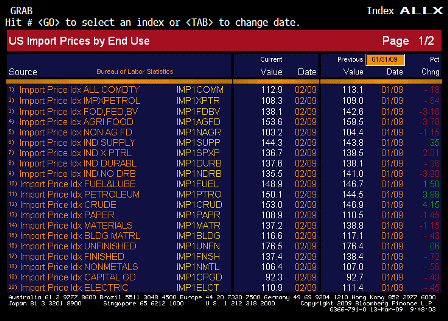
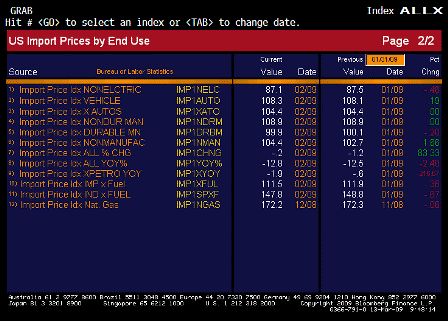
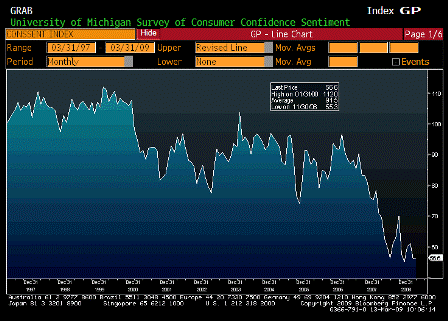
| Survey | 55.0 |
| Actual | 56.6 |
| Prior | 56.3 |
| Revised | n/a |
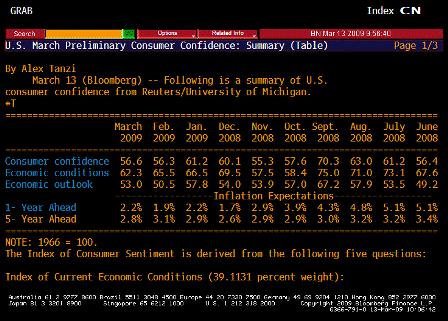
[top]
Karim writes:
Yes, but slightly, progressively, lower for the last two weeks.
Yes, they lag some.
Yes, core retail sales now up two months in a row. January income/spending up as well.
Yes, and with increasing consumption the decline in GDP isn’t sustainable.
And this is before the fiscal adjustments kick in.
Some overnight eco news that caught my eye:
[top]
One by one they are finally getting around to doing what they should have done long ago.
In my opinion, it’s all gotten ‘over the hump’ and the Obamaboom is underway with new fiscal measures adding fuel to the fire as they kick in.
Most recessions are inventory cycles of one kind or another.
Q2 08 was up 2.8% real when the Great Mike Masters Interplanetary Inventory Liquidation hit with a vengeance in July.
Supply from inventory liquidation took away demand for new production, triggering an unprecedented downward spiral in the real economy that brought the already stressed world financial sector/equity markets as well.
The automatic stabilizers of falling tax revenue and rising transfer payments increased the deficit to something over 5% of GDP annualized by year end.
This process directly adds nominal income and ‘savings’ of financial assets to the non govt sectors, until it reverses.
The inventory liquidation seemed to end in late December, as savings was reported to have leaped to over 5% of income (annualized) with the budget deficit doing much the same.
Personal income/spending turned up in January as Federal pay raises kicked in as well.
Core retail sales firmly up January and February- Q1 GDP estimates being revised up.
The unprecedented damage to the real economy and our standard of living could have been avoided by a proactive fiscal response soon after commodity prices broke and GDP forecasts were being revised down.
But that was not to happen.
Instead we got the fiscal response the ‘ugly way’ via falling revenues and rising transfer payments from the collapse in the real economy.
But now that process looks like it may have run its course, with the federal deficit (ex TARP which doesn’t count for this purpose- it’s just a shifting around of financial assets) annualizing at well over 5% of GDP for Q1 09.
And, as in previous cycles, the long delayed political response kicks in after the bottom and the Obamaboom begins!
Also, as previously discussed, there has been no action taken to reduce fuel consumption in the near term, so expect any demand to give the Saudis cover to raise prices to any level they want without ‘blame.’
And, with employment and wages improving only with a considerable lag, and the outsized support directed to banking and the financial sector, watch for the transfer of wealth to the upper income groups quickly surpass the extremes of the previous administration.
Kanjorski: Congress May Need To Act On Mark-to-market Rules
by Jesse Westbrook
Mar 12 (Bloomberg) — U.S. Representative Paul Kanjorski said Congress will revise an accounting measure that banks blame for exacerbating the financial crisis if regulators don’t act “quickly†to give companies more leeway in applying the rule.
“If the regulators and standard setters do not act now to improve the standards, then the Congress will have no other option,†Kanjorski, the Pennsylvania Democrat who leads a House financial services subcommittee, said at a hearing today. So- called mark-to-market accounting has “produced numerous unintended consequences.â€ÂÂ
[top]
Looks to me at current prices every public company is a takeover target, including Berkshire itself.
Buffett Resumes US takeover Hunt as Prices, Competition Ease
by Betty Liu and Erik Holm
Mar 12 (Bloomberg) — BillionaireWarren Buffett, who took a four-country tour of Europe less than a year ago in search of takeover targets, now says buying opportunities are presenting themselves in the U.S.
[top]
Citigroup Will Have to Sell More Assets: Whitney
Mar 10 (CNBC) — Whitney also said that the government is trying to sweeten deals for the private sector in order to get more cash infusions into U.S. banks. “The government cannot do it alone,” said Whitney. “They need the private sector to come back.”
[top]